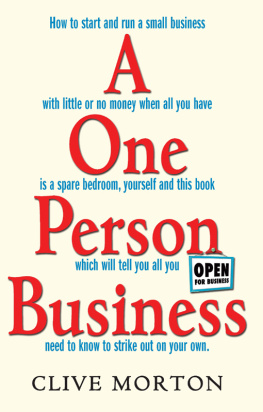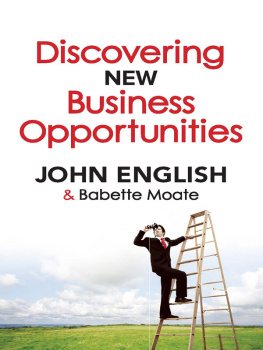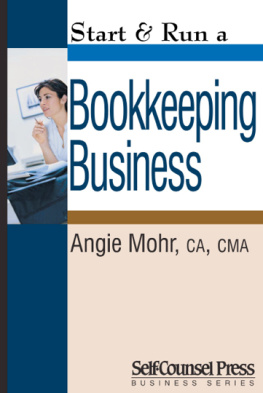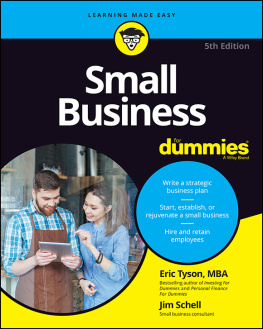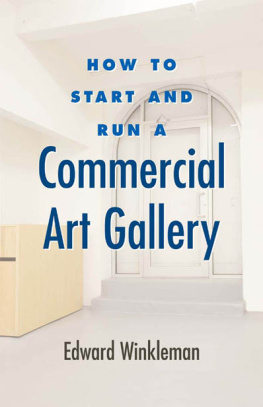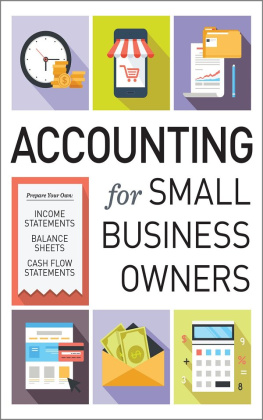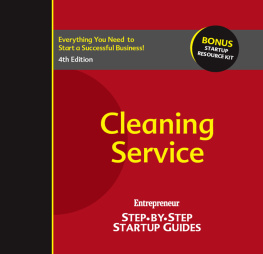How To Start and Run
A ONE PERSON BUSINESS
How To Start and Run
A ONE PERSON BUSINESS
CLIVE MORTON

Constable & Robinson Ltd
5556 Russell Square
London WC1B 4HP
www.constablerobinson.com
First published in the UK by How To Books,
an imprint of Constable & Robinson Ltd, 2013
2013 Clive Morton
The right of Clive Morton to be identified as the author of this work has been asserted by him in accordance with the Copyright, Designs and Patents Act 1988
All rights reserved. This book is sold subject to the condition that it shall not, by way of trade or otherwise, be lent, resold, hired out or otherwise circulated in any form of binding or cover other than that in which it is published and without a similar condition including this condition being imposed on the subsequent purchaser.
A copy of the British Library Cataloguing in
Publication Data is available from the British Library
ISBN 978-1-84528-503-6
eISBN 978-1-84528-532-6
Typeset by TW Typesetting, Plymouth, Devon
Printed and bound in the UK
13 5 7 910 8 6 4 2
Cover design: Mousemat Design Ltd
Contents
Specialist businesses and internet
Creative people
Creative people
Preface
Several million people have already struck out on their own why dont you join them?
Napoleon once said, England is a nation of shopkeepers. It was intended as a derogatory remark but, in fact, pointed to the independent streak in many of our countrymen who, even 200 years ago, supported themselves and built a lifestyle from their own efforts a heritage of which we should all feel proud.
Certainly running your own business is not for the work shy. In the early years you probably work longer hours than most of your former workmates and you have to handle administrative functions at the end of the day, such as raising invoices, keeping records and planning the next job. But for most of us who do our own thing, there is greater job satisfaction, a sense of achievement and, once established, greater financial rewards. I have run my own businesses for more than 30 years and cannot envisage a job offer that would tempt me to work for somebody else. I have had my share of ups and downs but now, in later life, I have a sense of freedom and independence that is not available to most employees.
In my earlier career I ran other peoples businesses in the packaging, engineering and toy industries before launching out, practising as an accountant and business consultant providing services to smaller companies. Many of my friends operate their own companies and I enjoy analysing the formulae, prospects and limitations of various business concepts. It is my view that business pays for everything and is badly treated in the UK, an over-governed society run by bureaucrats who do not have the balls to run a company but enjoy telling everybody else what to do. Without businesses we would quickly revert to almost pre-historic conditions. Business gives employment to the masses in every country. Employees and businesses pay the taxes that fund the government who use the taxes to employ more people, most of whom lack the nous to understand that their incomes are derived from business, not from some political party handing out largess in order to win votes.
Today, as I write, the country is in dire straits, largely due to being mismanaged by people who lack business experience and do not understand the nature of competition or the constant need for innovation, and product and efficiency improvements.
For most of my life the UK has been in the top five largest economies in the world. If we are to remain even among the top ten, it will be done by creating new businesses that ultimately give gainful employment to committed workers, pay reasonable taxes and contribute to a growing national output. This will not be brought about by politicians and public servants, although they could help by cutting red tape and interfering less often.
So if you are thinking of starting a new business be assured that it is one of the most important contributions a person can make to their country.
Your own rewards will be personal growth, greater independence and financial benefits.
So read on to learn how to accomplish these ends and, when you do launch out, keep this manual handy for future reference.
1 | Starting a service-based business |
For those of you who lack funds to invest but who, nevertheless, want to own and run a business of your own, the opportunities are more restricted than for those with a reasonable lump sum available and the assets to back borrowings. Almost any business, however, requires some investment. This is usually in the form of income sacrifice for a period of time until the business is up and running, or you may have to allocate part of your home to the business for use as an office, studio or consulting room, etc.
The business opportunities are likely to be restricted to those that offer a service rather than a product, as products cost money to stock and deliver.
For those of you who lack the funds to invest it is most likely that you will offer a service, based on your personal skills, although it may be possible to act as a sales agent and sell other peoples products or to trade on the internet. At this stage, however, we will talk about services. Those available may be classified into groups under the following headings:
Provision of services to the general public
Provision of services to commercial undertakings and/or government
Creative concepts authors, artists, inventors, etc.
Understanding the common ground in all one person businesses
I want to stress a fundamental point at this stage that in all one person businesses you will be providing a service or a product to either the general public or to commercial businesses/government departments and, in some cases, to both. In everything I have written, and will be further writing about, I am looking at the common ground these services and products share. I fully understand that an architects training and background and the nature of their work is entirely different from that of a beauty therapist or plasterer. In creating a business, however, they face many similar problems.
It is for the individual to understand the nature of their own skills and the special features of their trades or professions; the management techniques I describe apply to, and can be used in every business, and so I ask all my readers to think about what I say in relation to their chosen occupation and to bear in mind that, if they want to succeed, they will also need to acquire some general management skills, depending on how far they want to grow their businesses. I shall also deal with practical application of commercial law in relation to running a business.
Professional services
Professional services usually, but not always, require the clients to visit the professional. This is partly traditional and partly associated with costs because it is widely understood and accepted that professional services are charged by the hour and, therefore, travel to the client would add to the final bill. There are, of course, many exceptions to this, such as where architects and surveyors need to visit premises and sites, but much of their work is still carried out in offices.
Management services
Management services form a growing category as many middle-aged managers, in particular, have a range of skills and experience but find themselves frustrated or redundant and/or in a situation where they cannot increase their incomes, and often have to accept lower remuneration. For such people self-employment could and should be the perfect antidote so this, too, will be treated as a further separate group.
Next page
